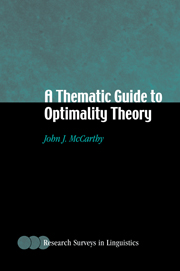Book contents
- Frontmatter
- Contents
- How to Use This Book
- Acknowledgments
- Prologue
- 1 The Core of Optimality Theory
- 2 The Context of Optimality Theory
- 3 The Results of Optimality Theory
- 4 The Connections of Optimality Theory
- Epilogue
- Appendix A Frequently Asked Questions
- Appendix B Symbols and Abbreviations
- References
- Index of Names
- Index of Constraints
- Index of Languages
- Index of Topics
Prologue
Published online by Cambridge University Press: 08 January 2010
- Frontmatter
- Contents
- How to Use This Book
- Acknowledgments
- Prologue
- 1 The Core of Optimality Theory
- 2 The Context of Optimality Theory
- 3 The Results of Optimality Theory
- 4 The Connections of Optimality Theory
- Epilogue
- Appendix A Frequently Asked Questions
- Appendix B Symbols and Abbreviations
- References
- Index of Names
- Index of Constraints
- Index of Languages
- Index of Topics
Summary
Optimality Theory (OT) was first described in depth by its creators, Alan Prince and Paul Smolensky, in a course presented at the University of California, Santa Cruz, in 1991 (Prince and Smolensky 1991). The first detailed exposition of the theory appears in Prince and Smolensky (1993). Since 1993, there has been a great deal of interest in this emerging theory; it has been the subject of a large and growing literature, an extensive electronic archive (http://roa.rutgers.edu), many courses and conference papers, and several textbooks. Although it was originally applied to phonology, the relevance of OT to topics in morphology, syntax, sociolinguistics, psycholinguistics, and semantics has become increasingly apparent.
One of the most compelling features of OT, in my view, is the way that it unites description of individual languages with explanation of language typology. As a phonologist, I have always been impressed and sometimes overwhelmed by how the complexity and idiosyncrasy of each language's phonology is juxtaposed with the clarity and abundance of solid typological generalizations. Even though this is arguably the central research problem of phonology and of linguistic theory in general, progress in consolidating description and explanation has at best been halting and occasionally retrograde.
OT, though, is inherently typological: the grammar of one language inevitably incorporates claims about the grammars of all languages. This joining of the individual and the universal, which OT accomplishes through ranking permutation, is probably the most important insight of the theory. It comes up again and again throughout this book, as a core premise of the theory, as a discipline for practitioners, and as the source of many empirical results in phonology, syntax, and allied fields.
- Type
- Chapter
- Information
- A Thematic Guide to Optimality Theory , pp. 1 - 2Publisher: Cambridge University PressPrint publication year: 2001



